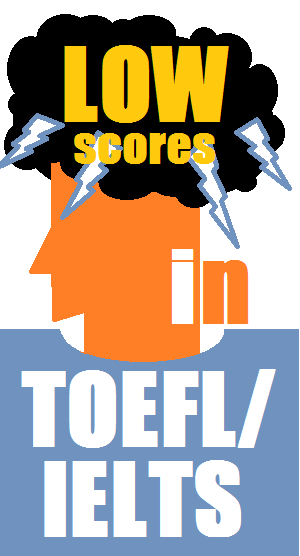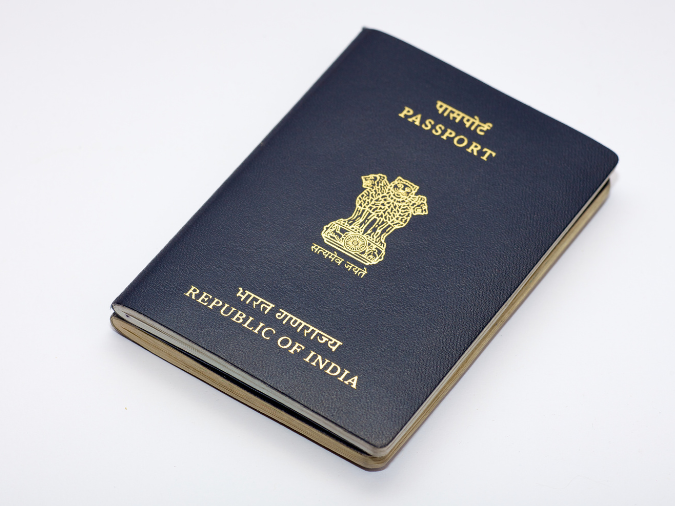What is the Minimum Score Required?
Most American Universities regard a score of 80 (out of 120) in TOEFL, as an acceptable minimum score for admission. However, students applying to high-ranking colleges generally need a minimum score of 100 on TOEFL or, a score of band 7 (out of 9) on the IELTS. What happens if you get a lower score than you require? Does that mean that admission is not possible?
What if I have Less than the Minimum Score Required in TOEFL or IELTS?
For students, a low score does not necessarily mean an application reject. University admissions committees assess English proficiency based on other application criteria, apart from test scores. In case your score is less than the minimum required you may need to take an English Language course in the University, followed by a test. This course will have to be taken along with the regular curriculum and you will be required to pay an additional fee for it. The best thing to do is to retake the TOEFL and improve your score before joining the University. That way you can get an exemption from the remedial English course.
Good News for Indian Students
However, there is good news for Indian students. In 2011, the country average for India was 92 in TOEFL, much higher than the global average (which was about 68) and also the minimum requirement of 80 for American colleges. Institutions requiring an IELTS assessment, generally accept a minimum score of 6, which is also the present global average. Again, students from India fared marginally better than this figure with a mean score of 6.1. Hence, if you’re the “average Indian student”, you will probably do well on whichever English assessment test you take.
How Can I Improve My TOEFL or IELTS Score?
But, what if you have already given the TOEFL or IELTS and have a low score? How do you prepare? (Find out about coaching for TOEFL and IELTS.)
Preparing for TOEFL
- A good idea is to start well in advance, since you will need adequate practice to get used to the TOEFL format.
- Starting early is especially important if you are weak in grammar
- If your grammar is weak, consult the following sites for grammar:
- Get the practice material on the TOEFL site. There you will find free material that you can download: TOEFL’s how to study guide and some sample questions.
- About the Test
- Sample Questions & Practice Tests
- TOEFL iBT App
- TOEFL TV on the YouTube site – this will give you an overview of the exam and strategies for tackling it
After you have done this preliminary work, take a diagnostic test to find out where you stand. If you still feel uncertain about whether you can get the required score, join our 3-week intensive online/classroom course that will equip you with all the strategies and tips required to achieve your target score. Further, the detailed feedback on your essays and one-on-one appointments with the faculty will help you overcome your weaker areas. Click to find out more about TOEFL coaching.
Preparing for IELTS
Read the following recommended books
- Intermediate English Grammar by Raymond Murphy (Cambridge University Press)
- Advanced English Grammar by Martin Hewings (Cambridge University Press)
After you have done this preliminary work, take a diagnostic test to find out where you stand. If you still feel uncertain about whether you can get the required score, join our one-month intensive online/classroom course that will equip you with all the strategies and tips required to achieve your target score. Further, the detailed feedback on your essays and one-on-one appointments with the faculty will help you overcome your weaker areas. Click to find out more about IELTS coaching.
At Dilip Oak’s Academy, we understand the significance of this journey. Thus, we offer comprehensive GRE coaching in Pune, both online and classroom, to support you in this crucial aspect of your academic journey. Further, our admission counseling services can guide you through the entire process from Shortlisting Universities to Visa Counseling. With our expertise, we have successfully sent 32,000 students to various prestigious American universities like MIT, Stanford, Cornell, and Carnegie Mellon. To enroll in our comprehensive services, book a free consultation or call us at 91-020-67444222.
We offer GRE, TOEFL, and IELTS coaching, GRE Self Prep and guide students with university selection, application essays, and visa counseling under our Admission Counseling Services for USA, Germany and Canada.
Graduate admissions in the United States are highly competitive, with top universities receiving thousands of applications each year. A well-crafted recommendation letter can be your secret weapon to stand out in this fierce competition. In this blog, we’ll explore the importance of recommendation letters and provide tips on securing strong ones for your graduate admissions journey.
What is a recommendation letter?
In the context of higher education in the United States, recommendation letters are critical documents that vouch for your qualities, background, and achievements as a candidate for doctoral or master’s programs. Virtually every university requires applicants to submit a minimum of three recommendation letters along with their application. The purpose of these letters is to provide a comprehensive view of the applicant and assess their suitability for the academic program.
Who Should Write Your Recommendation Letters?
- If you are a student, your recommendation letters should ideally come from teachers who have substantially interacted with you. This could include those who have taught you important subjects or supervised research projects, seminars, or papers. The best choices are professors who can speak highly of your academic work and compare you favorably with your peers.
- If you are a working professional and your work experience is relevant to your intended field of study, a letter from your immediate supervisor is valuable. In cases where you have significant work experience from different organizations, obtaining letters from multiple relevant supervisors is acceptable.
Qualities of Effective Recommenders
Your recommenders should possess the following qualities:
- They should know you well and be able to provide specific insights into your academic abilities and personal qualities.
- They should be able to write persuasively and effectively.
- It’s also beneficial if your recommenders have good credentials and a clear understanding of your educational goals.
What Recommendation Letters Should Include
An effective recommendation letter should encompass the following points:
- The recommender’s relationship with you specifying how long they’ve known you and in what capacity.
- An assessment of your academic performance, including your relative ranking and intellectual capabilities.
- Special achievements, especially in projects or research papers.
- An evaluation of your communication skills, particularly how well you can present seminars or projects.
- Insights into your social skills, such as your ability to work well with others and your leadership qualities.
- Some background information about the recommender, particularly if their work is not widely recognized outside India.
What Elevates a Recommendation Letter
A truly excellent recommendation letter goes beyond summarizing your performance and qualities. It substantiates its claims with real-life examples of your initiative, creativity, perseverance, intelligence, leadership, or other admirable qualities in various contexts, such as project work or seminars. These specific incidents add credibility to the recommender’s assertions. A letter that conveys genuine enthusiasm and endorsement can leave a lasting impression on graduate admissions committees. More importantly, recommendation letters should be well-structured, error-free, and easy to read.
Practical Considerations
- It’s crucial to maintain a positive and respectful relationship with your recommenders, as writing recommendation letters is a time-consuming task.
- If you’re submitting the letter in a physical format, the recommender must seal and sign it. Many universities now prefer online submission.
In essence, a well-crafted recommendation letter is an essential component of your application to American universities. It offers a holistic view of your qualifications and character and can significantly influence your admission prospects. Therefore, it is crucial to choose the right recommenders and assist them in providing a persuasive, detailed, and unique letter. Remember, a well-written recommendation letter is not just a piece of paper; it’s your advocate in the admissions process.
At Dilip Oak’s Academy, we understand the significance of this journey. Thus, we offer comprehensive GRE coaching in Pune, both online and classroom, to support you in this crucial aspect of your academic journey. Further, our admission counseling services can guide you through the entire process from Shortlisting Universities to Visa Counseling. With our expertise, we have successfully sent 32,000 students to various prestigious American universities like MIT, Stanford, Cornell, and Carnegie Mellon. To enroll in our comprehensive services, book a free consultation or call us at 91-020-67444222.
We offer GRE, TOEFL, and IELTS coaching, GRE Self Prep and guide students with university selection, application essays, and visa counseling under our Admission Counseling Services for USA, Germany and Canada.

Pursuing a Master’s degree in the United States is a dream for many international students. However, before embarking on this educational journey, there are several academic and English language requirements you must meet. Here is a comprehensive guide to help you prepare for your MS in the USA:
1. Academic Requirements:
- For Technical Fields (e.g., Engineering, Pharmacy, Architecture): Most American universities require applicants to have completed a four-year Bachelor’s degree, which amounts to 16 years of education.
- For Non-Technical Fields (e.g., Arts, Management): If you’re aiming for such fields, you will generally need 17 years of education (12+3+2), which often includes a Master’s degree after completing a traditional bachelor’s degree.
2. GRE Score:
The GRE (Graduate Record Examination) is a standardized aptitude test used by American universities to assess a student’s verbal reasoning, quantitative reasoning, analytical writing, and critical thinking skills.
- As of September 2023, the test duration has been reduced to 2 hours. A strong GRE score is essential for admission.
- While some universities have waived the GRE requirement due to the pandemic, many reputable institutions still consider it important. Thus, having a competitive GRE score can still greatly benefit your chances of acceptance.
- A score of 320+ is competitive for top 40 universities, with a minimum of 300 usually required for most institutions.
3. TOEFL or IELTS Score:\
Since English may not be your native language, demonstrating proficiency is crucial. Universities often require one of the following English language tests:
- TOEFL (Test of English as a Foreign Language): Most American universities require a score of 80 or higher out of 120.
- IELTS (International English Language Testing System): This test is scored on a scale of 9, with many universities requiring a band score of at least 6.5.
4. Good Academic Performance:
Your undergraduate academic record plays a significant role in your application’s success. Maintaining a strong GPA is essential.
- Ideally, aim for a GPA of 9.0 or higher for admission to top-tier American universities.
- A GPA of over 7.0 is often sufficient for admission to good universities.
- Avoid backlogs and year-downs
5. Curricular and Co-Curricular Accomplishments:
American universities value not only your academic achievements but also your practical experiences and involvement in extracurricular activities:
- Engage in projects and seminars relevant to your field.
- Consider publishing papers in nationally and internationally recognized journals.
- Participate in conferences and gain practical experience through internships, whether paid or unpaid.
6. Relevant Work Experience:
Having relevant work experience can increase your chances of admission to prestigious universities and improve your job prospects after completing your MS.
7. Documentation:
Applicants for the GRE examination must provide a valid passport as the only authentic ID proof.
Embarking on an MS journey in the USA is an exciting opportunity, and meeting these prerequisites will set you on the path to success.
At Dilip Oak’s Academy, we understand the significance of this journey. Thus, we offer comprehensive GRE coaching in Pune, both online and classroom, to support you in this crucial aspect of your academic journey. Further, our admission counseling services can guide you through the entire process from Shortlisting Universities to Visa Counseling. With our expertise, we have successfully sent 32,000 students to various prestigious American universities like MIT, Stanford, Cornell, and Carnegie Mellon. To enroll in our comprehensive services, book a free consultation or call us at 91-020-67444222.
We offer GRE, TOEFL, and IELTS coaching, GRE Self Prep and guide students with university selection, application essays, and visa counseling under our Admission Counseling Services for USA, Germany and Canada.
When preparing for an exam, it is important for us to understand the format, structure and syllabus of that exam. So, in this blog, we will try to understand every aspect of the GRE Quantitative Reasoning Section, which will help us develop a very focused approach to ace this section. It will also answer the frequently asked questions (FAQs) that students ask while preparing for this section. So, let’s begin!
Assessing the Content of the GRE Quantitative Reasoning Section
The GRE Quantitative Reasoning section of the GRE mainly evaluates:
- Your basic understanding of the mathematical concepts
- Your ability to interpret and analyze quantitative information
- Your application skills in solving the questions within the given time limit
Understanding the scope of the syllabus for the Quantitative Reasoning Section
- The GRE broadly tests you on four main topics: Arithmetic, Algebra, Geometry and Data Analysis. The Math Review (PDF) file provides detailed information about the scope of the syllabus.
- To summarize, it tests you on all your high school math concepts.
- Good news: No trigonometry, no calculus!
Exploring the Structure of the Quantitative Reasoning Section
- The Test comprises two Quantitative Reasoning sections with 27 questions to be completed in 47 minutes.
- The section-wise break-up is as follows:
- Section I: 12 questions to be completed in 21 minutes
- Section II: 15 questions to be completed in 26 minutes
- The following question types are asked:
- Multiple Choice (Single Correct):
- Multiple Choice (One or more correct)
- Numeric Entry Questions
- Quantitative Comparison Questions
- An on-screen calculator is available for the Quantitative Reasoning Section. (It is not a scientific calculator.)
Identifying Resources for Preparation
The following ETS GRE Resources would be the most authentic prep material as they include practice questions straight from the source.
A myriad of publications is available in the market, and a vast resource of material is on the net. But while choosing material, it would be wise to choose GRE-oriented material as it would cater to the format of the exam. At Dilip Oak’s Academy, our books and online practice material have been designed keeping the Test in mind, thus ensuring your focused preparation.
Achieving Success in the Quantitative Reasoning Section: Top Strategies
To get a good score in the Quantitative section of the GRE, ensure that your preparation involves the following steps:
Concept building:
- Get a good grasp of the fundamental concepts
- Memorize your formulae and computational tables to quickly and accurately solve questions.
- Get familiar with the Question Types.
Practice, practice, practice:
- Strengthen your concepts by solving a large number of practice questions specifically designed for the GRE.
- Practice using tricks, shortcuts and time-saving strategies
- Focus on increasing your accuracy and time management.
Testing:
- Testing yourself at regular intervals will familiarize you with the format of the exam.
- Review/feedback will help you understand your strengths and weaknesses, which can be worked upon.
- Taking at least two tests under simulated testing conditions would be a good approach as it would make you comfortable with the testing environment with time restrictions.
Now that we have covered the basics, let’s discuss some other questions you may have.
What if I have ‘Math Phobia’?
Many students are always scared of math and thus experience ‘math phobia’, which probably has no cure. Maybe you are not good at math naturally, but don’t give up. Remember, the GRE covers only the basic mathematical concepts studied at your school level, so your math skills are not being tested in this exam. Your application skills are put to the test, along with your logical and analytical thinking. Focus on your strong areas, not the troubled areas that haunt you. Lingering on these may only increase your anxiety and thus affect your preparation and, consequently, your performance.
What should be my approach if I have a strong Math background?
If that is the case, you may find the questions on this exam very simple. But beware! You may be caught off guard! Instead of becoming complacent, a good strategy would be to brush up on your concepts and use the simplicity of this exam to your advantage. Overdependence on your mathematical abilities may affect your score adversely, narrowing your chances of securing admission to a good university.
What Next?
- Now that you have understood the focus of the exam and its format, start preparing according to the three steps mentioned above.
- Ensure that you have a very good understanding of the fundamental concepts.
- Completing 12 and 15 questions in 21 and 26 minutes respectively is one of the main challenges you will face while answering the Math section. Remember, your speed and accuracy should go hand in hand. You cannot afford to compromise one at the cost of the other.
To summarize, a dedicated and focused approach will surely enhance your test-taking skills, which will guarantee a good score. It’s not necessary to study hard; study smart. Wishing you all the BEST!!!
At Dilip Oak’s Academy, we understand the significance of this journey. Thus, we offer comprehensive GRE coaching in Pune, both online and classroom, to support you in this crucial aspect of your academic journey. Further, our admission counseling services can guide you through the entire process from Shortlisting Universities to Visa Counseling. With our expertise, we have successfully sent 32,000 students to various prestigious American universities like MIT, Stanford, Cornell, and Carnegie Mellon. To enroll in our comprehensive services, book a free consultation or call us at 91-020-67444222.
We offer GRE, TOEFL, and IELTS coaching, GRE Self Prep and guide students with university selection, application essays, and visa counseling under our Admission Counseling Services for USA, Germany and Canada.
The GRE Verbal Reasoning section is often perceived as a challenging hurdle for many test-takers. Within this section, Text Completion and Sentence Equivalence questions can be particularly challenging but fear not- we’re here to guide you. Our expert faculty members have curated valuable tips and strategies to help test-takers like you conquer these question types. By honing your skills in Text Completion and Sentence Equivalence, you can confidently tackle the GRE Verbal Reasoning section and achieve your desired scores.
Understanding Text Completion:
Text Completion questions present a passage with one to three blank spaces, and candidates must select the correct words or phrases to fill these gaps. The challenge lies in choosing the most appropriate words that maintain the coherence and meaning of the passage. To tackle Text Completion effectively, follow these tips:
- Focus on Context: Grasp the passage’s context and main idea to predict the type of words needed
to fill the blanks. - Look for Clues: Analyze surrounding words and sentences for hints about the missing words’
meanings, including transitional phrases and tone. - Eliminate Irrelevant Options: Rule out answer choices that do not fit the passage’s context or alter the intended meaning.
- Consider Logical Flow: Ensure the selected words maintain a coherent and logical flow within the passage.
Mastering Sentence Equivalence:
Sentence Equivalence questions present a single sentence with one blank space. Candidates are tasked with selecting two words from the six given options that create sentences with similar meanings. While the core strategies remain the same for both questions types, here’s how to tackle Sentence Equivalence questions effectively:
- Identify Keyword Clues: Pay attention to crucial keywords in the sentence, as they often provide clues about the missing word’s meaning.
- Antonyms and Synonyms: Consider words with opposite or synonymous meanings that fit the sentence’s context.
- Avoid Extreme Choices: Eliminate answer choices with extreme meanings that do not align with the sentence’s tone or context.
- Utilize the Process of Elimination: Narrow down choices by eliminating unlikely options, increasing the chances of selecting the correct word pair.
Build a Strong Vocabulary
A robust vocabulary is vital for excelling in GRE Verbal Reasoning. Regularly practice learning new words, understanding their meanings, and exploring their usage in context. Dilip Oak Academy offers comprehensive GRE preparation resources, including word lists and mnemonic techniques to aid memorization. Read this blog for more tips to master your vocabulary: 5 Tips from Our Expert Faculty
Read Diverse Texts
Expand your vocabulary and comprehension skills by engaging with a wide range of topics, including literature, academic articles, and news pieces. Read extensively to bolster your language proficiency. Here are some blogs to get you started: GREat Five Minute Reads
Familiarize with GRE Question Styles
Practice with official GRE Verbal Reasoning questions to become familiar with the question styles, formats, and difficulty levels. Analyzing answer explanations for incorrect choices helps you understand common pitfalls and improves your critical thinking skills.
Time Management
Efficient time management is crucial during GRE Verbal Reasoning. Allocate appropriate time to each question, and if you encounter a challenging question, flag it and move on. Later, during the review phase, allocate time to revisit flagged questions. The well-designed study plan and guidance from the expert faculty during the classes will boost your GRE preparation and give you the confidence to ace the test.
Take Full-Length Practice Tests
Simulate the real GRE experience by taking full-length practice tests under timed conditions. Full-length practice tests help build endurance, identify weak areas, and fine-tune your test-taking strategies. This will help you get accustomed to the pressure and time constraints.
By mastering Text Completion and Sentence Equivalence, you can confidently approach the GRE and achieve your dream of pursuing further studies, like MS in the USA.
As a premier study abroad institute in Pune, Dilip Oak Academy is committed to helping students excel in the GRE exam. Our comprehensive GRE preparation resources include coaching- classroom & online with our experienced faculty members, online prep resources with access to over 2000 questions and a self-prep module which includes video lessons. With a focus on excellence, Dilip Oak Academy is your partner in achieving GRE success.
We also offer TOEFL, and IELTS coaching, and guide students with university selection, application essays, and visa counseling under our Admission Counseling Services for USA, Germany and UK. To enroll, call us on 91-020-67444222, 91-8007878495




















